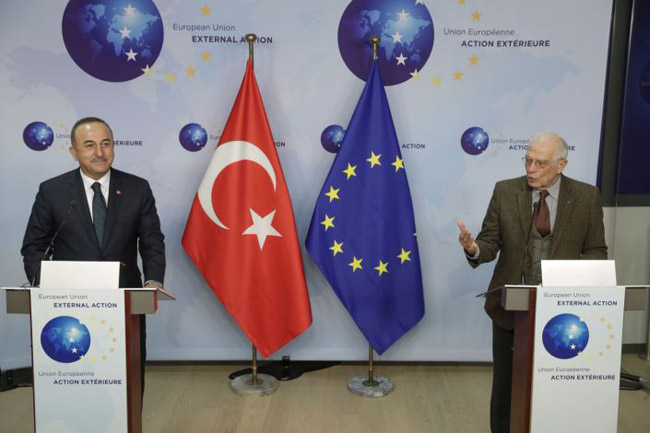Brussels … News Time
On his arrival in Brussels, Turkish Foreign Minister Mevlüt Çavuşoğlu was received by the EU’s top diplomat and the bloc’s foreign policy chief, Josep Borrell. The purpose of Mevlüt Çavuşoğlu’s visit is to determine the details of the upcoming visit of two of the most important EU leaders to Turkey. European Commission President Arzula von der Leyen and EU Council President Charles Michel will visit Ankara in the near future because they were recently invited by Turkish President Recep Tayyip Erdogan. Tayyip Erdogan gave. At the start of his talks with Josep Borrell in Brussels today, Turkish Foreign Minister Mevlüt Çavuşoğlu said that in order to ensure a constructive environment and a positive agenda of cooperation on a bilateral basis, the parties must take concrete steps that can be beneficial in the long run. Tensions between the European Union and Turkey reached a new high last year when Turkey sent a ship to search for new gas reserves in some disputed waters. Therefore, when the two member states of the Union, Greece and Cyprus, expressed their anger over the Turkish government’s move, the result was a further escalation of the existing tension between the Ankara government and the Union.
The Ankara government is now showing great enthusiasm for better relations with the Union. Ahead of Mevlüt Çavuşoğlu’s visit to Brussels, Turkey and Greece agreed to resume talks to resolve their joint maritime dispute. Talks on maritime disputes between the two countries have been suspended since 2016. Earlier this month, Turkish President Recep Tayyip Erdogan had a telephone conversation with European Commission President von der Leyen. He stressed that both Ankara and Brussels should put aside last year’s bitterness and make a fresh start in bilateral relations. In this context, he also invited the President of the European Commission von der Leyen and the President of the European Council Charles Michel to visit Turkey. The EU’s position so far on improving relations with Ankara is that the new signals from Turkey are positive, but the Ankara government must also translate its statements into concrete action. Turkey is also an ally of the European Union as a member of the Western defense alliance NATO. But tensions between Ankara and Brussels last year were sparked by a number of international political issues that the union strongly objected to. These reasons include Ankara’s differences with Greece and Cyprus, the gas exploration process in the disputed waters, and Turkey’s role in the conflicts in war-torn Syria, Libya and Nagorno-Karabakh.




